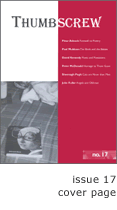|

|
 |

|
 |

|
 I never expected Thumbscrew to last so long. I never expected Thumbscrew to last so long.
The magazine was born in Oxford during the long hot summer of 1994. I had been talking for over a year about the possibility of establishing some antidote to a London poetry scene which appeared to outsiders as cosy, self-savouring, mediocre. Finally, my friends John Redmond and Ian Sansom persuaded me to go ahead. They showed all the passion, I suspected, of people who loved the idea but were relieved that someone else would be carrying it out.
Our first problem was a name. I was keen to avoid any connection or confusion with Oxford Poetry, not wanting the magazine to become fastened to a dying animal. I came across the name Thumbscrew in, of all places, Frederick C. Crews’s The Pooh Perplex: A Student Casebook. Crews had invented a fierce Leavisite critic called Simon Lacerous, who held that “The trouble with Winnie-the-Pooh is that it constitutes a vast betrayal of Life”. As Lacerous’s fictional potted biography reported, “He and his wife, Trixie, were the guiding spirits behind the now defunct but extremely influential quarterly, Thumbscrew”. There it was – a gift – though the name has occasionally caused problems. When for several months in 1996 the Royal Mail insisted on delivering the Thumbscrew post to the wrong address, the aged recipient declared that as a member of Amnesty International it was his duty to destroy all letters addressed to an instrument of torture.
The next step was to persuade people to contribute. I drew up a wish-list of contents for issue 1, and fired off letters to the fortunate few. Most never replied, but Miroslav Holub sent an essay and two poems, and after that I felt obliged to make the magazine happen. Craig Raine contributed a wonderful and, thankfully, very long essay on swearing. Christopher Logue agreed to be interviewed. I armlocked several of my friends and acquaintances. Someone wrote an essay arguing that Carol Ann Duffy’s poetry was rubbish. And that was issue 1, which no one bought at the time, but which has long since sold out. On the strength of it Keiren Phelan at Southern Arts gave us some money, and Ted Hughes sent an essay on Sylvia Plath for issue 2. The magazine had survived.
Thumbscrew was lucky to catch a wave of upcoming critics and poet-critics, all in their twenties, who shared not so much a program or manifesto as a distaste for the insider dealings of the poetry scene. From Ireland came John Redmond, David Wheatley, Justin Quinn; from England, Ian Sansom; from the States, Stephen Burt; from South Africa, Elizabeth Lowry. I could rely on any of them to state what they thought and to state it intelligently and entertainingly; between them, they very soon began to influence for the better the culture of poetry reviewing in this country. Plus ça change: the London scene is still cosy, self-savouring and mediocre, as Private Eye (for example) has recently noted. Yet I’ve often been pleasantly surprised to hear reports of the discomfort Thumbscrew has caused, most publicly in the case of Roddy Lumsden who was moved to threaten, “I had two separate, serious offers to have a vindictive reviewer beaten up not long ago. I won’t think twice next time.” The more annoyance the magazine has provoked, the better it has been doing its job of reviewing honestly and without favour. That honesty has accommodated celebration as well as criticism, constantly supporting major figures like Paul Muldoon, Anne Stevenson and Geoffrey Hill (even when the latter was deeply unfashionable), and never ignoring the work of small presses and unknown poets.
The little magazine is the natural home of the deranged, the talentless and the bitterly disenfranchised: no doubt Thumbscrew’s enemies would claim that each of those categories has received ample representation in its pages. The little magazine is also the most likely place to find the next great poet or critic, and to hear unmodish opinions. As T.S. Eliot argued, “it must be the small and obscure papers and reviews, those which are hardly read by anyone but their own contributors, that will keep critical thought alive and encourage authors of individual talent.” The great advantage of an independent little magazine is that it need not pander to anyone. Freethinking and unconcerned by establishment cliques, it helps – often almost invisibly – to keep the culture healthy.
It may seem ironic that, having achieved sound finances, a stable subscription base, and a fairly wide reputation, Thumbscrew should now be killed off. When the post started being delivered by the crate-load I thought it may be time to move on. And Thumbscrew could not risk becoming repetitive or predictable, or finding itself part of an establishment it has spent so much time mocking. Having arrived, the only decent thing to do is leave immediately.
from Tim Kendall's editorial to the last issue No 20/21 | |







 I never expected Thumbscrew to last so long.
I never expected Thumbscrew to last so long.